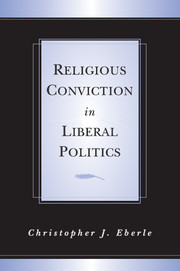2 - Pluralism and Religion
Published online by Cambridge University Press: 18 December 2009
Summary
INTRODUCTION
Many citizens of the United States have been raised on a myth. We were raised to believe that our Pilgrim forebears made their way to the New World in order to escape religious persecution, succeeded in setting up a “city on a hill,” a polity populated largely by committed Christians, shortly after which there ensued a process of religious decline that has continued to this day (notwithstanding some momentary reversals of fortune). Of course, Americans disagree on their evaluation of that story: some regard the pervasively religious society of early America with nostalgia and pine for a return to that Golden Age; others are more than happy that that Golden Age has, to mix metaphors, ridden off into the sunset. But both those who want America to return to its Christian past and those who want to bury that past accept the same basic story line: the history of America is a history of religious decline.
The story of a decline of religion in America is just one chapter in a much longer narrative, a narrative that, like many a modern myth, enjoys the imprimatur of science and that is codified in the so-called theory of secularization. The theory of secularization, the claim that “modernization necessarily leads to a decline of religion, both in society and in the minds of individuals,” has ineradicable narrative elements: once upon a time, people and society were pervasively religious; then society began to change – factories were built, governments refused to impose orthodoxy on their subjects, citizens of different faith traditions lived and worked in the same environments, people got education, science freed itself from the fetters of religious intolerance; and ever since then people and society have become progressively irreligious.
- Type
- Chapter
- Information
- Religious Conviction in Liberal Politics , pp. 23 - 47Publisher: Cambridge University PressPrint publication year: 2002



